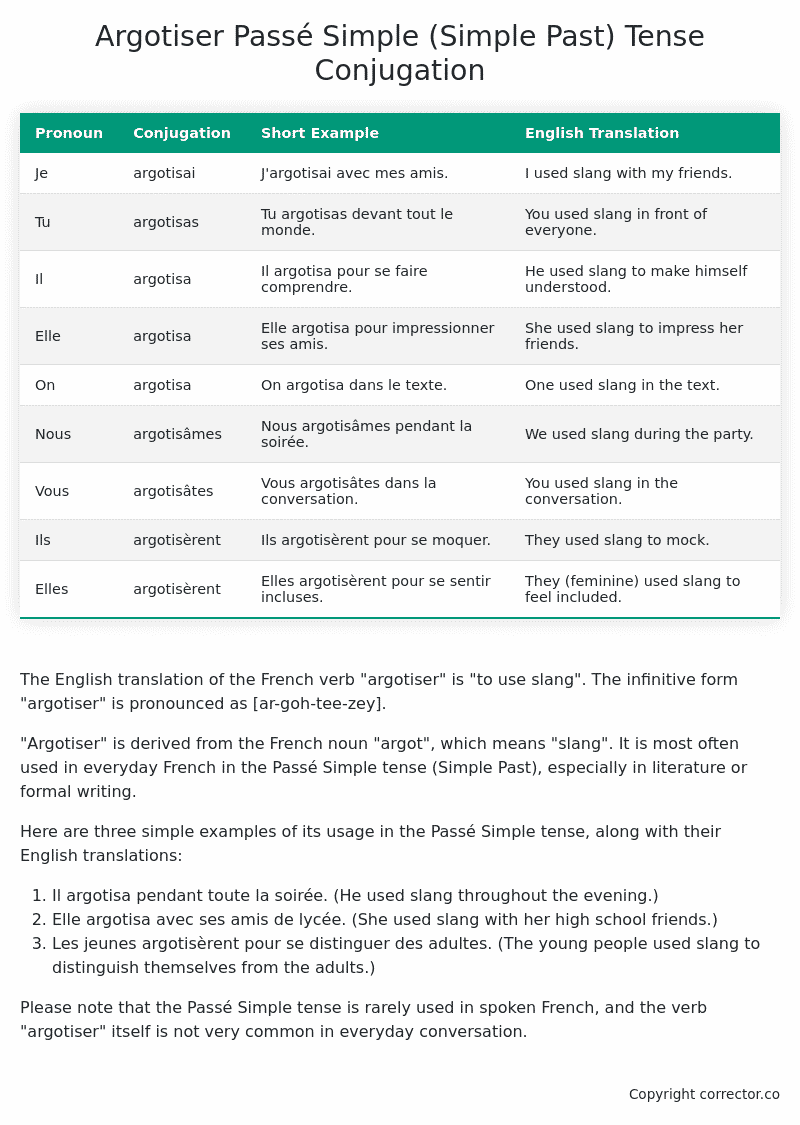Passé Simple (Simple Past) Tense Conjugation of the French Verb argotiser
Introduction to the verb argotiser
The English translation of the French verb “argotiser” is “to use slang”. The infinitive form “argotiser” is pronounced as [ar-goh-tee-zey].
“Argotiser” is derived from the French noun “argot”, which means “slang”. It is most often used in everyday French in the Passé Simple tense (Simple Past), especially in literature or formal writing.
Here are three simple examples of its usage in the Passé Simple tense, along with their English translations:
- Il argotisa pendant toute la soirée. (He used slang throughout the evening.)
- Elle argotisa avec ses amis de lycée. (She used slang with her high school friends.)
- Les jeunes argotisèrent pour se distinguer des adultes. (The young people used slang to distinguish themselves from the adults.)
Please note that the Passé Simple tense is rarely used in spoken French, and the verb “argotiser” itself is not very common in everyday conversation.
Table of the Passé Simple (Simple Past) Tense Conjugation of argotiser
| Pronoun | Conjugation | Short Example | English Translation |
|---|---|---|---|
| Je | argotisai | J’argotisai avec mes amis. | I used slang with my friends. |
| Tu | argotisas | Tu argotisas devant tout le monde. | You used slang in front of everyone. |
| Il | argotisa | Il argotisa pour se faire comprendre. | He used slang to make himself understood. |
| Elle | argotisa | Elle argotisa pour impressionner ses amis. | She used slang to impress her friends. |
| On | argotisa | On argotisa dans le texte. | One used slang in the text. |
| Nous | argotisâmes | Nous argotisâmes pendant la soirée. | We used slang during the party. |
| Vous | argotisâtes | Vous argotisâtes dans la conversation. | You used slang in the conversation. |
| Ils | argotisèrent | Ils argotisèrent pour se moquer. | They used slang to mock. |
| Elles | argotisèrent | Elles argotisèrent pour se sentir incluses. | They (feminine) used slang to feel included. |
Other Conjugations for Argotiser.
Le Present (Present Tense) Conjugation of the French Verb argotiser
Imparfait (Imperfect) Tense Conjugation of the French Verb argotiser
Passé Simple (Simple Past) Tense Conjugation of the French Verb argotiser (You’re reading it right now!)
Passé Composé (Present Perfect) Tense Conjugation of the French Verb argotiser
Futur Simple (Simple Future) Tense Conjugation of the French Verb argotiser
Futur Proche (Near Future) Tense Conjugation of the French Verb argotiser
Plus-que-parfait (Pluperfect) Tense Conjugation of the French Verb argotiser
Passé Antérieur (Past Anterior) Tense Conjugation of the French Verb argotiser
Futur Antérieur (Future Anterior) Tense Conjugation of the French Verb argotiser
Subjonctif Présent (Subjunctive Present) Tense Conjugation of the French Verb argotiser
Subjonctif Passé (Subjunctive Past) Tense Conjugation of the French Verb argotiser
Subjonctif Imparfait (Subjunctive Imperfect) Tense Conjugation of the French Verb argotiser
Subjonctif Plus-que-parfait (Subjunctive Pluperfect) Tense Conjugation of the French Verb argotiser
Conditionnel Présent (Conditional Present) Tense Conjugation of the French Verb argotiser
Conditionnel Passé (Conditional Past) Tense Conjugation of the French Verb argotiser
Conditionnel Passé II (Conditional Past II) Tense Conjugation of the French Verb argotiser
L’impératif Présent (Imperative Present) Tense Conjugation of the French Verb argotiser
L’impératif Passé (Imperative Past) Tense Conjugation of the French Verb argotiser
L’infinitif Présent (Infinitive Present) Tense Conjugation of the French Verb argotiser
L’infinitif Passé (Infinitive Past) Tense Conjugation of the French Verb argotiser
Le Participe Présent (Present Participle) Tense Conjugation of the French Verb argotiser
Le Participe Passé (Past Participle) Tense Conjugation of the French Verb argotiser
Struggling with French verbs or the language in general? Why not use our free French Grammar Checker – no registration required!
Get a FREE Download Study Sheet of this Conjugation 🔥
Simply right click the image below, click “save image” and get your free reference for the argotiser Passé Simple tense conjugation!

Argotiser – About the French Passé Simple (Simple Past) Tense
Formation
Usage
Narration
Historical Context
Interactions with other tenses
Passé Composé
Imparfait
Conditional and Subjunctive
Summary
I hope you enjoyed this article on the verb argotiser. Still in a learning mood? Check out another TOTALLY random French verb conjugation!


